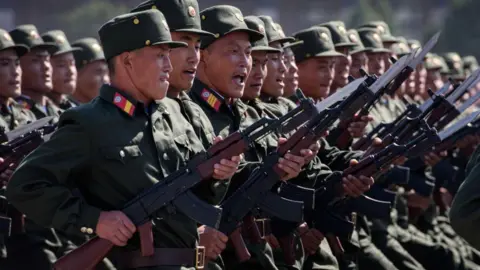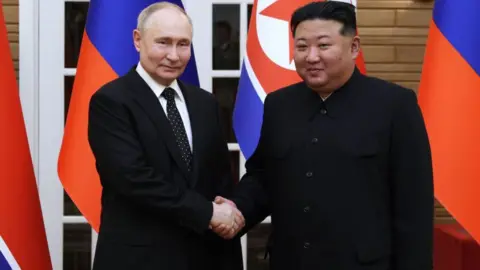What we know about North Korean troops fighting Russia's war
 Getty Images
Getty ImagesNorth Korea's deployment of troops to fight alongside Russian forces in Ukraine has attracted global attention - as well as speculation as to how they would be deployed on the battlefield.
Pyongyang has sent at least 10,000 troops to Russia, according to Kyiv and Seoul, who have also said North Korean casualties have been rising since entering combat in early December.
The tolls cited vary. South Korea said this week that more than 1,000 North Korean troops have been killed or wounded, while Ukrainian President Volodymyr Zelensky put the number at 3,000.
Pentagon officials had confirmed there had been casualties but did not provide a figure.
The Pentagon said that it appeared the soldiers were being used in infantry roles around the Kursk border region, which Moscow has been trying to recapture from Ukraine - meaning it's possible that North Korean troops have not been deployed across the border in Ukraine.
This news comes nearly two months after Ukrainian President Volodymyr Zelensky and South Korean officials accused Pyongyang of deploying troops to support Russia’s invasion.
But little information has emerged since then, and Moscow and Pyongyang have not responded directly to these reports.
Estimates of troop numbers have ranged from about 11,000 - a Pentagon calculation - to as many as 100,000, according to unnamed sources quoted in Bloomberg news.
At first, their lack of battlefield experience was given as a key reason why they might be assigned non-combat roles. But that assumption was re-evaluated after the US and Ukraine said that North Korean troops had engaged in combat with Ukrainian soldiers.
So what do we know about the role of North Korean troops in Russia's war?
How effective are these troops?
In short, it is hard to say.
Secretive North Korea has one of the world’s largest militaries, with 1.28 million active soldiers, but unlike in Russia, the Korean People's Army (KPA) has no recent experience of combat.
Pyongyang’s army is “thoroughly indoctrinated but with low readiness,” says Mark Cancian, from the Centre for Strategic and International Studies (CSIS).
But he does not see them as cannon fodder, adding that such a characterisation is “Ukrainian bravado”.
Ukrainian and South Korean intelligence services have said that many of the troops deployed to Russia are some of Pyongyang’s best, drawn from the 11th Corps, also known as the Storm Corps. The unit is trained in infiltration, infrastructure sabotage and assassinations.
These soldiers are “trained to withstand a high degree of physical pain and psychological torture”, says Michael Madden, a North Korea expert from the Stimson Center in Washington.
“What they lack in combat they make up for with what they can tolerate physically and mentally,” he adds.
Mr Cancian agrees that “if these are special operations forces, they will be much better prepared than the average North Korean unit".
He adds: "The Russians appear to be giving them additional training, likely on the special circumstances of the war in Ukraine."
This is supported by videos on social media, which show men believed to be North Koreans in Russian uniform, at what appear to be military training facilities in Russia.
As the war in Ukraine creeps towards its third year, the North Korean troops may be "the best capable" among the troops available to Russia, says Chun In-bum, a retired South Korean army lieutenant-general.
North Korean soldiers who had defected over the last decade or so told the BBC that it would be a mistake to underestimate Pyongyang's troops. These interviews shed light on the condition of these troops on the Ukrainian frontline.
Moscow has been recruiting at least 20,000 new soldiers a month to help bolster its war effort, with more than 1,000 Russian soldiers killed or wounded on average daily, according to Nato.
“[Russia] has been sending troops to the front without proper training. Compared to such recruits, North Koreans are trained and motivated. They are not combat-tested currently, but that soon will not be the case,” Lt-Gen (retd) Chun said.
Still, some experts believe the language barrier and unfamiliarity with Russian systems would complicate any fighting roles. They suggest instead that Pyongyang’s troops are being tapped for their engineering and construction capabilities.
Why is N Korea supporting Russia's war?
"For North Korea, [such deployments are] a good way to earn money,” says Andrei Lankov, director of the Korea Risk Group.
South Korean intelligence estimates that Moscow is paying Pyongyang $2,000 (£1,585) per soldier every month - and most of this money ends up in the state’s coffers.
Pyongyang could also gain access to Russian military technology, which Moscow would otherwise have been reluctant to transfer, Mr Lankov adds.
 Getty Images
Getty ImagesFor Moscow, North Korean troops would help solve its widely-reported manpower problem.
The US estimates that some 600,000 Russian troops have been killed or wounded since the invasion of Ukraine began in 2022.
Moscow has tried to “minimise domestic political impact” by offering bonuses to recruits who volunteer and enlisting foreigners with the promise of citizenship, says Mr Cancian from CSIS.
In September this year, Russian President Vladimir Putin issued an order - for the third time since the war started - to expand his army.
"With Russia reportedly suffering over 1,000 casualties on the battlefield [per day], reducing its own losses could alleviate some pressure on the Putin regime," agrees Lami Kim, a professor of Security Studies at the Daniel K Inouye Asia-Pacific Center for Security Studies.
What does South Korea think?
These developments worry Seoul, especially as tensions spiral on the Korean peninsula.
In October, the North blew up sections of two roads that connected it to South Korea, days after accusing Seoul of flying drones into Pyongyang.
This was after the two countries engaged in a tit-for-tat campaign, flying thousands of trash and propaganda balloons into each other’s territories.
The Koreas have also suspended a pact aimed at lowering military tensions, shortly after the North declared the South was "enemy number one”.
So South Korea is uneasy about the North acquiring new military prowess.
Troops in South Korea have also not fought in a major conflict since the Vietnam war, which ended in 1975. And Seoul fears that “its adversary could boast more hostile capabilities” as a result of the experience its soldiers would get on the battlefield, Lt-Gen (retd) Chun says.
While South Korea has accused the North of also supplying weapons to Russia, it says sending troops goes well beyond that.
It has also expressed “grave concern” over a pact between Pyongyang and Moscow, which pledges that the two counties will help each other in the event of “aggression” against either country.
And it has reiterated that it would consider aiding Ukraine “for defensive purposes”.
If that happens, it would mark a shift in South Korea's longstanding policy of not supplying weapons to countries engaged in active conflict.
